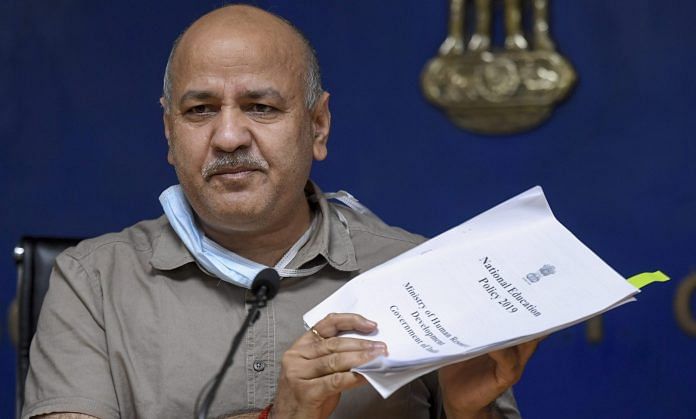New Delhi: The new National Education Policy (NEP) recommends a “highly-regulated” and “poorly-funded” education model, while it is either confused or silent on how the reforms outlined in it will be achieved, Delhi Deputy Chief Minister Manish Sisodia said on Thursday.
Referring to the policy as a “progressive document”, the Aam Aadmi Party (AAP) leader said it recognises the flaws in the current education system but was unable to break free of the pressures of old traditions.
“The NEP is a progressive document but there is no roadmap for its implementation.
“The nation was waiting for a new education policy for 34 years. It is here now. It is a forward-looking document, which accepts the flaws of today’s education system but has two issues with it — it was unable to break free of the pressures of education’s old traditions and does not say how the reforms that it speaks of will be achieved. The policy is either silent or confused on these issues,” Sisodia said at a press conference.
“The policy recommends a highly-regulated and poorly-funded education model. There is an attempt to escape from the government’s responsibility to provide quality education in its schools,” he added.
Teaching in the students’ mother tongue or regional languages up to Class 5, lowering the stakes of board exams, a single regulator for higher education institutions except for law and medical colleges and common entrance tests for universities are part of the sweeping reforms in the NEP unveiled on Wednesday.
“Fundamental teaching in mother tongue or regional languages is a progressive step. We also welcome the focus on early childhood education,” the deputy chief minister said.
Sisodia, who is also the education minister of Delhi, said, “If there are going to be common entrance exams in universities, why do we need board exams? What is the need for duplication? A policy, which is now going to be in place for the next few decades, is completely silent on sports.”
Replacing the 10+2 structure of the school curricula with a 5+3+3+4 curricular structure corresponding to the 3-8, 8-11, 11-14 and 14-18 age groups respectively, scrapping M.Phil programmes and implementing common norms for private and public higher education institutions are among other salient features of the new policy.
Also read: A second shot at boards, no MPhil, a blow to rote-learning — what Modi govt’s NEP brings



